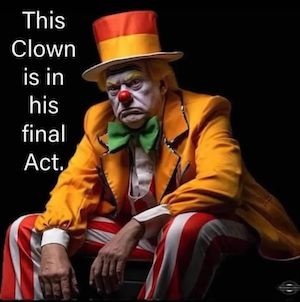People cannot believe Trump’s latest statement on religion in the government
 “They say ‘separation between church and state,’ they told me. I said, alright, let’s forget about that for one time.”
“They say ‘separation between church and state,’ they told me. I said, alright, let’s forget about that for one time.”
On Thursday Trump signed an executive order creating a presidential commission on religious liberty. During the White House event, he openly questioned the principle of separation between church and state.
In a clip circulating on social media from the event, Trump said of his faith advisors, “They work right out of the White House. That’s never been done before. No other president allowed that. They say ‘separation between church and state,’ they told me. I said, alright, let’s forget about that for one time.”
He continued, “We said, separation, really, is that a good thing or a bad thing? I’m not sure, but whether there’s separation or not, you guys are in the White House, where you should be, and you’re representing our country. And we’re bringing religion back to our country. And it’s a big deal.”
Trump’s newly formed commission on religious liberty will be chaired by Texas Lieutenant Governor Dan Patrick, an evangelical Christian who has described the United States as “a Christian nation” and argued that the Constitution contains “no separation of church and state.” The commission, which is predominantly composed of Christian members (there’s one Rabbi), includes Dr. Ben Carson as vice chair, television host Dr. Phil, Cardinal Timothy Dolan, and Kelly Shackelford, CEO of First Liberty, a conservative legal group based in Plano, Texas.
The First Amendment of the Constitution prohibits Congress from making any law “respecting an establishment of religion, or prohibiting the free exercise thereof.” This clause, called the Establishment Clause, has long been interpreted as establishing the principle of separation between church and state.
The US Supreme Court has upheld this interpretation in key cases, such as Everson v. Board of Education (1947), which applied the Establishment Clause to state governments, and Engel v. Vitale (1962), which struck down state-sponsored prayer in public schools. These rulings reflect a long effort to maintain government neutrality in religious affairs.
Now, people are saying Trump’s remarks and actions appear to be directly challenging that tradition. “Let’s forget about everything in the Constitution,” one person wrote in reaction to Trump’s comments.
“Why don’t you just rip the constitution to shreds while you’re at it,” another said.
“He treats the First Amendment like a parking ticket: annoying, optional, and easy to ignore,” someone else said.
Even lawmakers started speaking out. US Rep. Jared Huffman said, “The separation of church and state was created to protect Americans from exactly this kind of religious favoritism. No one religion should reign supreme — and all must stay separate from government.”
Another user echoed a similar concern: “As a Christian, I never wanted the government having any say over my faith, and that stands for this crew, too.”
Well, as Trump fills faith councils and commissions with overwhelmingly Christian figures and casts doubt on foundational constitutional principles, one thing becomes increasingly clear: His vision of “religious liberty” seems closely aligned with one idea — furthering Christian nationalism.
Written by Alana Valko for BuzzFeed ~ May 2, 2025
